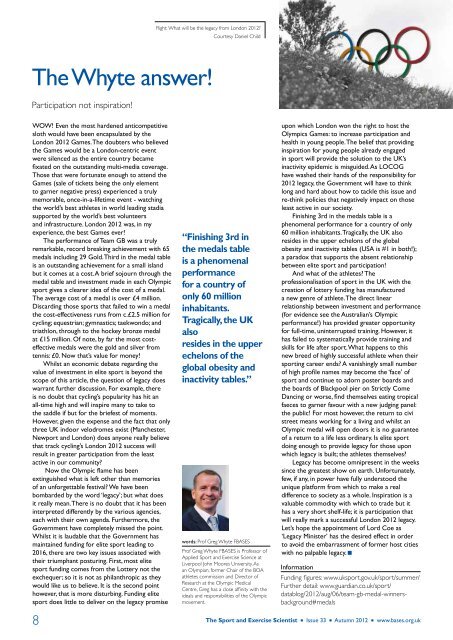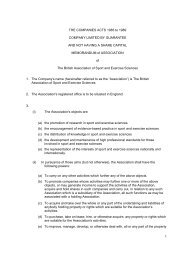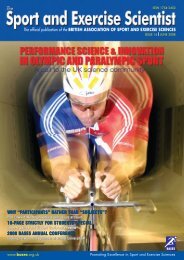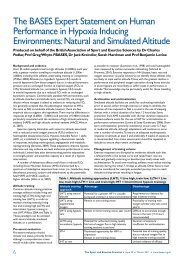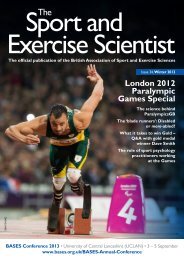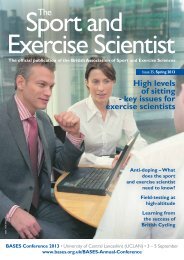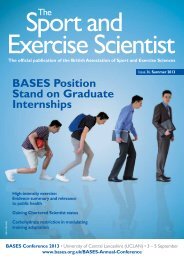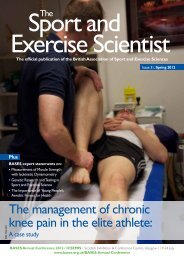Issue 33 Autumn 2012 - Bases
Issue 33 Autumn 2012 - Bases
Issue 33 Autumn 2012 - Bases
- No tags were found...
Create successful ePaper yourself
Turn your PDF publications into a flip-book with our unique Google optimized e-Paper software.
Right: What will be the legacy from London <strong>2012</strong>?Courtesy Daniel ChildThe Whyte answer!Participation not inspiration!WOW! Even the most hardened anticompetitivesloth would have been encapsulated by theLondon <strong>2012</strong> Games. The doubters who believedthe Games would be a London-centric eventwere silenced as the entire country becamefixated on the outstanding multi-media coverage.Those that were fortunate enough to attend theGames (sale of tickets being the only elementto garner negative press) experienced a trulymemorable, once-in-a-lifetime event - watchingthe world’s best athletes in world leading stadiasupported by the world’s best volunteersand infrastructure. London <strong>2012</strong> was, in myexperience, the best Games ever!The performance of Team GB was a trulyremarkable, record breaking achievement with 65medals including 29 Gold. Third in the medal tableis an outstanding achievement for a small islandbut it comes at a cost. A brief sojourn through themedal table and investment made in each Olympicsport gives a clearer idea of the cost of a medal.The average cost of a medal is over £4 million.Discarding those sports that failed to win a medalthe cost-effectiveness runs from c.£2.5 million forcycling; equestrian; gymnastics; taekwondo; andtriathlon, through to the hockey bronze medalat £15 million. Of note, by far the most costeffectivemedals were the gold and silver fromtennis: £0. Now that’s value for money!Whilst an economic debate regarding thevalue of investment in elite sport is beyond thescope of this article, the question of legacy doeswarrant further discussion. For example, thereis no doubt that cycling’s popularity has hit anall-time high and will inspire many to take tothe saddle if but for the briefest of moments.However, given the expense and the fact that onlythree UK indoor velodromes exist (Manchester,Newport and London) does anyone really believethat track cycling’s London <strong>2012</strong> success willresult in greater participation from the leastactive in our community?Now the Olympic flame has beenextinguished what is left other than memoriesof an unforgettable festival? We have beenbombarded by the word ‘legacy’; but what doesit really mean. There is no doubt that it has beeninterpreted differently by the various agencies,each with their own agenda. Furthermore, theGovernment have completely missed the point.Whilst it is laudable that the Government hasmaintained funding for elite sport leading to2016, there are two key issues associated withtheir triumphant posturing. First, most elitesport funding comes from the Lottery not theexchequer; so it is not as philanthropic as theywould like us to believe. It is the second pointhowever, that is more disturbing. Funding elitesport does little to deliver on the legacy promise“Finishing 3rd inthe medals tableis a phenomenalperformancefor a country ofonly 60 millioninhabitants.Tragically, the UKalsoresides in the upperechelons of theglobal obesity andinactivity tables.”words: Prof Greg Whyte FBASESProf Greg Whyte FBASES is Professor ofApplied Sport and Exercise Science atLiverpool John Moores University. Asan Olympian, former Chair of the BOAathletes commission and Director ofResearch at the Olympic MedicalCentre, Greg has a close affinity with theideals and responsibilities of the Olympicmovement.upon which London won the right to host theOlympics Games: to increase participation andhealth in young people. The belief that providinginspiration for young people already engagedin sport will provide the solution to the UK’sinactivity epidemic is misguided. As LOCOGhave washed their hands of the responsibility for<strong>2012</strong> legacy, the Government will have to thinklong and hard about how to tackle this issue andre-think policies that negatively impact on thoseleast active in our society.Finishing 3rd in the medals table is aphenomenal performance for a country of only60 million inhabitants. Tragically, the UK alsoresides in the upper echelons of the globalobesity and inactivity tables (USA is #1 in both!);a paradox that supports the absent relationshipbetween elite sport and participation!And what of the athletes? Theprofessionalisation of sport in the UK with thecreation of lottery funding has manufactureda new genre of athlete. The direct linearrelationship between investment and performance(for evidence see the Australian’s Olympicperformance!) has provided greater opportunityfor full-time, uninterrupted training. However, ithas failed to systematically provide training andskills for life after sport. What happens to thisnew breed of highly successful athlete when theirsporting career ends? A vanishingly small numberof high profile names may become the ‘face’ ofsport and continue to adorn poster boards andthe boards of Blackpool pier on Strictly ComeDancing or worse, find themselves eating tropicalfaeces to garner favour with a new judging panel:the public! For most however, the return to civistreet means working for a living and whilst anOlympic medal will open doors it is no guaranteeof a return to a life less ordinary. Is elite sportdoing enough to provide legacy for those uponwhich legacy is built; the athletes themselves?Legacy has become omnipresent in the weekssince the greatest show on earth. Unfortunately,few, if any, in power have fully understood theunique platform from which to make a realdifference to society as a whole. Inspiration is avaluable commodity with which to trade but ithas a very short shelf-life; it is participation thatwill really mark a successful London <strong>2012</strong> legacy.Let’s hope the appointment of Lord Coe as‘Legacy Minister’ has the desired effect in orderto avoid the embarrassment of former host citieswith no palpable legacy.InformationFunding figures: www.uksport.gov.uk/sport/summer/Further detail: www.guardian.co.uk/sport/datablog/<strong>2012</strong>/aug/06/team-gb-medal-winnersbackground#medals8The Sport and Exercise Scientist n <strong>Issue</strong> <strong>33</strong> n <strong>Autumn</strong> <strong>2012</strong> n www.bases.org.uk


